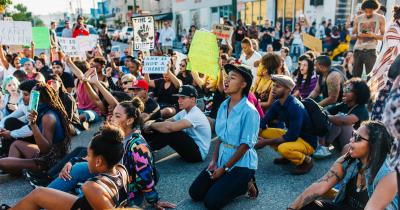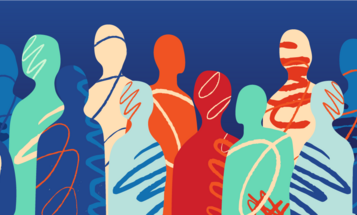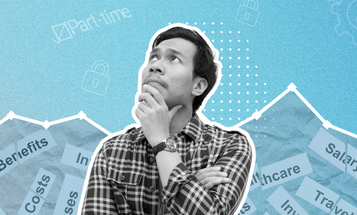
What Do Black People Have to Lose Under Trump?
The Trump administration’s policies hurt African Americans. Here are ten examples.

Repeatedly during his 2016 presidential campaign, Donald Trump appealed to black voters by asking, “What do you have to lose?” A year and a half into the Trump administration, we have enough evidence to answer the question definitively: everything. In nearly every major federal agency, the Trump administration has pursued policies harmful to black people.
Today, on June 19th—Juneteenth—we will take a moment to consider the rights, opportunities, and commitments to racial redress that black people are losing because of the Trump administration.
1. Ramping up Mass Incarceration
Attorney General Jeff Sessions has revitalized the war on drugs, reversed policies to prevent people from being jailed or imprisoned simply because they are poor, and opposed sentencing reforms that would reserve the harshest punishments for the most dangerous criminals.
2. Suppressing Civil Rights
The Civil Rights Division of the Department of Justice (DOJ), meanwhile, has gone from protecting civil rights to assaulting them. On voting rights, the division now supports unlawful voter purges in violation of the National Voter Registration Act. The DOJ is working to roll back all of the criminal justice, voting rights, and police-reform advances made in recent decades.
3. Failing to Address the Black Economic Recession
Although the black unemployment rate is historically low, it is still typical of what whites experience as a result of a recession. During recessions, policymakers enact economic stimulus measures to reduce unemployment. Donald Trump needs to unveil a realistic plan to create a million jobs for black workers—what is needed to create full employment for black Americans.
4. Taking Money Away from Black Workers
The Department of Labor has cost African-American workers hundreds of millions of dollars. The Trump administration refused to defend in court the Obama administration’s rule on overtime pay. The overtime pay rule would have benefitted 1.5 million black workers, nearly a third of all African Americans who are paid a salary.
5. Ending Protection from Predatory Lenders
The Consumer Financial Protection Bureau (CFPB) was established to protect consumers, but Trump has appointed Mick Mulvaney, who is hostile to the agency’s mission, as acting director. Under Mulvaney, the CFPB has dropped cases and put rulings on hold that would have reined in payday lenders that prey on black communities with interest rates exceeding 400 percent. In one particularly brazen move, the administration stripped enforcement powers from the CFPB’s Office of Fair Lending and Equal Opportunity, which had played a key role in the agency’s civil rights work, winning hundreds of millions of dollars for African-American consumers harmed by discriminatory lending.
6. Helping Predatory For-Profit Colleges Rip off Black Students
The Department of Education has weakened a critical consumer protection known as the “Borrower Defense” rule, designed to help student loan borrowers seek forgiveness when they have been defrauded by predatory colleges. The Department of Education has also delayed and attempted to rewrite a rule known as “Gainful Employment,” which was put in place to prevent unscrupulous career colleges from receiving federal funding. The Trump administration is reversing these protections and making ripping off low-income students of color easier for predatory, for-profit colleges.
7. Ignoring the Affordable Housing Crisis and Segregation
Under the Trump administration, the Department of Housing and Urban Development has only worked to make finding affordable housing more difficult for low-income families. Most recently, HUD has been considering tripling the rents of poor tenants in public housing. HUD also has weakened its commitment to fighting racial discrimination in housing and to fighting housing segregation.
8. Starving Poor Families
In its budgets, the Trump administration has proposed deep cuts (totaling more than $200 billion over 10 years) to the Supplemental Nutrition Assistance Program, as well as cuts to the Special Supplemental Nutrition Program for Women, Infants, and Children. These policies will likely increase hunger in black America.
9. Worsening the Health of Black Communities
Since Trump’s election, his administration has been dismantling the power of the Environmental Protection Agency (EPA) to regulate polluting industries and protect people’s health. Environmental deregulation disproportionately harms African Americans, who are already more exposed to pollution due to a long history of racially discriminatory policies. The Trump EPA’s attacks on environmental regulation are attacks on the health and safety of black communities across the country.
10. Homeland Insecurity for Black Immigrants and Black Muslims
The xenophobia and Islamophobia expressed by the Trump administration directly affects the black population. Ten percent of the black population in America is foreign-born and one-fifth of American Muslims are African American. Rather than continue the Obama administration policy of focusing on people convicted of violent crimes for deportation, Trump’s Department of Homeland Security is deporting individuals who have been productive members of American society for many years. A recent analysis of anti-Muslim hate found that 20 percent of people involved in documented instances of hate violence “referenced Trump, a Trump policy, or a Trump slogan.”
The Trump administration’s policies hurt African Americans. Sometimes the harm is because of indifference to the plight of black people, sometimes because the policies are designed to hurt the American working class and to help Wall Street, and sometimes because they seem designed specifically to harm African Americans.
On this Juneteenth, it is appropriate to remember the history of the black freedom struggle, because the future of the health, safety, and prosperity of black America depends on the commitment of people to join in and continue that struggle.
This list is comprised of excerpts from Social Exclusion: Black People Have Everything to Lose Under Trump, which is the second part in a series of short pieces concerning the dynamics of social exclusion and the relationship between individual instances of hostility towards people of color in the United States and how that hostility is powered by our policy choices. The series considers how social exclusion affects different aspects of our nation’s life (for instance, labor markets, education, criminal justice, and voting), and the important role that policy can play in repairing the harm that is being done.
Read the first paper in this series, Social Exclusion: The Decisions and Dynamics that Drive Racism
It offers the framework of social exclusion and particularly focuses on how social exclusion—through policies and practices—blocks black people from full participation and power in the United States.




